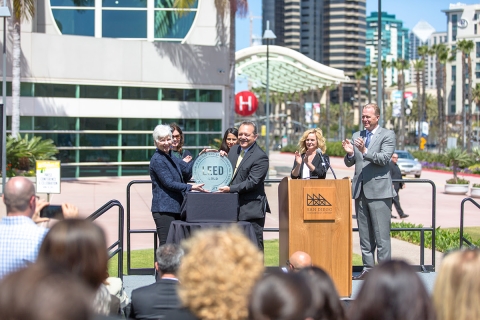San Diego Convention Center Achieves LEED Gold Certification

The San Diego Convention Center has taken its environmental ambitions to the next level by achieving Leadership in Energy and Environmental Design (LEED) Gold certification.
As one of the most popular and well-respected green building certification programs used worldwide, LEED is known as the foremost rating program for the design, construction, operation and maintenance of green buildings, homes and communities.
During a public celebration to mark this important milestone for the facility, San Diego Mayor Faulconer praised the venue’s efforts in achieving the benchmark environmental standards developed by the U.S. Green Building Council.
“San Diego is one of the greenest cities in the nation, so it makes sense that we are home to one of the greenest convention centers as well,” Mayor Faulconer said.
He continued, “As we move forward with plans to modernize and expand the San Diego Convention Center, this news shows how important it is to continually invest in this economic engine. With the support of organizations like the San Diego Convention Center, we can achieve the goals in our landmark Climate Action Plan to cut our city’s carbon footprint in half by 2035 and build a better future for all San Diegans.”
After achieving LEED Silver certification in 2011, the facility has been working overtime to reach the Gold standard and improve a sustainability business model that began when the venue first opened its doors in 1989.
In fact, long before “going green” was in fashion, the SDCC was the first facility to install recycling bins in 1990, according to SDCC officials.
The following sustainability achievements helped SDCC graduate from Silver to Gold certification:
• In 2016, the facility diverted a record 79 percent of materials, or 3,162 tons, an amount almost equal to the weight of eight Boeing 747s.
• Replaced old fluorescent lights with 11,650 energy-efficient LEDs in the exhibit hall, meetings rooms and offices.
• Ninety-eight percent of all restrooms have been renovated to low-flow water usage, helping reduce indoor water usage by 32 percent.
• The facility recycles 100 percent of all cardboard with the help of two cardboard balers.
• During Comic-Con alone, the SDCC recycled 50 tons of cardboard. That’s more than eight times the weight of the Gaslamp Quarter Archway sign that hangs above Fifth Avenue.
• All food scraps are all composted and reused by local gardeners.
• Untouched food that hasn’t spoiled gets donated to the San Diego Rescue Mission.
• Ninety-one tons of edible food leftover from events was donated last year, which helped feed 145,000 hungry San Diegans.
In addition, Centerplate, the facility’s in-house food and beverage team, has a sustainable food purchasing plan. This involves purchasing produce, vegetables and protein such as locally-caught fish, from within a 100-mile radius whenever possible.
Local farmers say this partnership is crucial to their business and helps boost the local economy.
“We at Moceri Produce believe that the convention center is a prime example of a way that local institutions and businesses can support local farms,” said Robert Farmer, purchasing agent, salesperson and program Manager for Morceri Farms, which helps supply the SDCC.
He continued, “By supporting the local economy with food purchases, this helps regional farmers practice their trade. And it enables the stewardship of the land, water, labor and environmental resources in order to create healthy, local food options for the guests the convention center.”
Being green also helps the convention center to continues to attract customers and boost the local economy.
In 2017, the estimated regional impact of San Diego’s conventions and meetings business is projected to be $1.1 billion.
“Sustainability is part of our DNA – it’s who we are,” said Clifford “Rip” Rippetoe, president and CEO of the SDCC.
He continued, “When meeting planners are choosing a destination, this matters. We know our customers want the San Diego experience and now they will know we are sustainability champions, as well.”
The SDCC also boasts an Energy Star Rating of 84, which demonstrates its performance to be more efficient than 84 percent of all convention centers.
In an effort to share best environmental business practices, the SDCC has joined the International Association of Venue Manager’s brand new Energy Management Council, which helps set policy for green meetings around the world.
“Buildings are a prime example of how human systems integrate with natural systems,” said Rick Fedrizzi, CEO and founding chair of the USGBC.
He added, “The San Diego Convention Center makes an immediate, positive impact on our planet, which will tremendously benefit us all.”
Want more news about the greening of the trade show industry? Make sure to subscribe to our bimonthly Green News e-newsletter here.


Add new comment